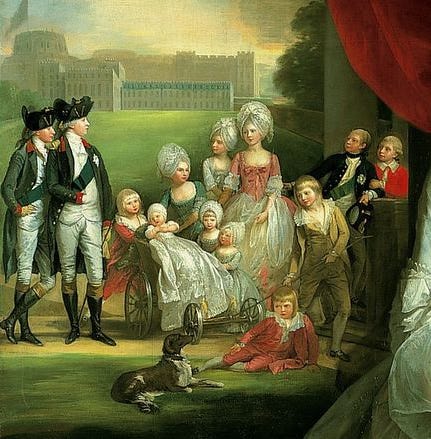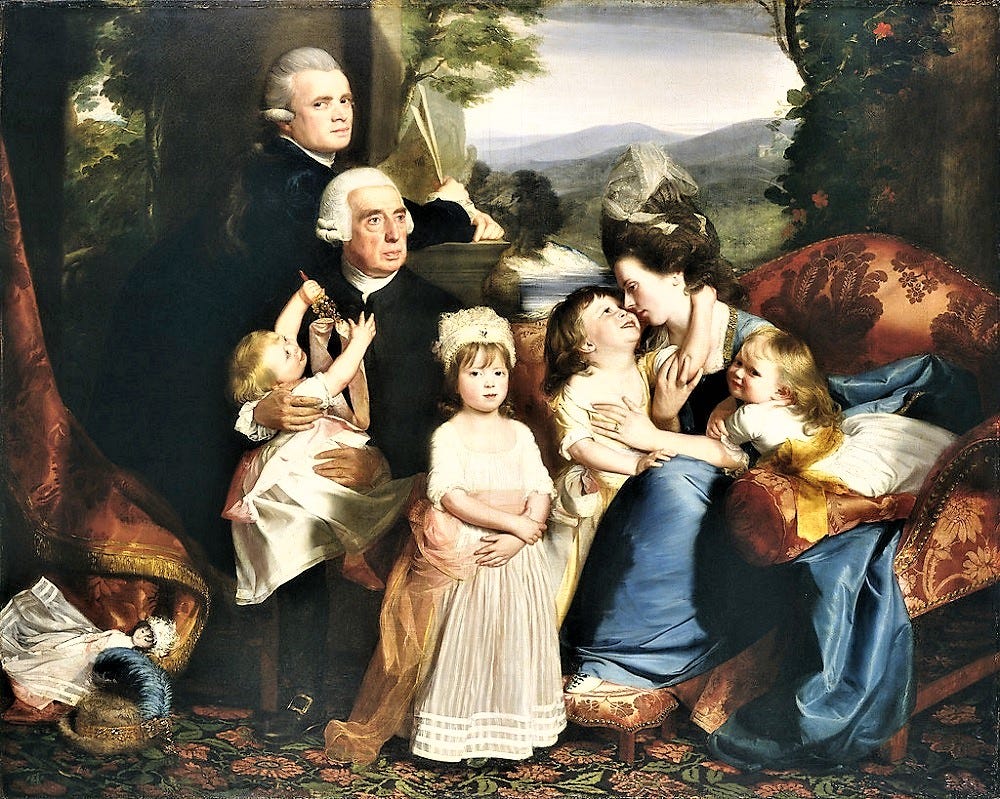People love arguing about which generation had it the toughest, and I’m no exception. Let’s discuss which generation had it harder as parents. Was it the generations facing infant mortality rates of 50% or more, or the generations that finally solved that puzzle and ended up with 13 or 14 children apiece and no mortal idea of what to do next?
I’m not even tempted to wade into modern generations. When I was expecting my oldest child, someone made the mistake (I’m assuming stupidity rather than malice) of handing me a copy of What to Expect When You’re Expecting, which is the most judgmental book written since the Book of Judgement. It makes me sad that new parents are handed this book as the parenting “Bible,” mostly because new parents shouldn’t be expected to absorb written material longer than “how to cook a frozen pizza,” but also because it’s a terribly written, condescending, nonscientific, 600-page screed of old wives’ tales. Modern parents are better off ignoring 99% of the unsolicited advice they get, which will be endless and almost always comes from people you wouldn’t trust to water your plants. We don’t need parenting advice from mediocrities. We want the good stuff, like parenting advice from famous philosophers, and that’s what you’ll get here!
The 1700s was a particularly confusing time for parents in the Western world. Once children weren’t dying at a coin flip, you could let yourself get attached to the little rugrats and their unique personalities. But you could get too attached, which was a problem when you made out your will and realized your meager possessions weren’t going to go far divided by 12 offspring. There’s a such thing as “having too many children,” and this was an epidemic problem in the 1700s. Advances leading to the “too many children” problem included inoculation and new understanding about infectious disease, improved hygiene, new medical instruments for difficult child deliveries, such as forceps, and the professionalization of obstetrics. Perhaps the biggest reason for the drop in child mortality in England was the realization that babies breastfed by their own mothers rather than a wet nurse had a much higher chance of survival. (That’s a topic I would write a book about if I were a professional researcher / historian with unlimited time, but I’m not, so I’ll just say that, like most things involving parenting, it’s more horrifying than you really want to contemplate. https://daily.jstor.org/lifesaving-horrifying-history-wet-nurses/)
The “too many children” problem reached every level of British society, from the richest to the poorest. King George III, the tyrant addressed in the Declaration of Independence, had 15 children, and 13 of them reached adulthood. That is a ridiculous number of children in need of productive employment. He didn’t know what to do with them, and they almost all turned out badly. Some of the daughters might have been alright – although probably not the ones hidden away to have secret illegitimate babies. https://www.englishmonarchs.co.uk/hanover_21.html

Not even unlimited riches and privilege help in the quest to be the Perfect Parent, a truth that stares us in the face every day. But the English-speaking peoples of the 1700s didn’t outsource the problem to “books you might buy in an airport.” They saw parenting as one of the most important issues of their time, and they took the philosophy of parenting seriously. They asked their heavy hitters for help: Locke, Robespierre, Hogarth, Goldsmith. Let’s see what timeless advice they can give us.
Children, they wanted us to know, were no longer merely dependents but moral beings to be cared for and educated to become “reasoning moral adult[s] in a corrupt and complex world.”
John Locke wrote Some Thoughts on Education in 1693. He believed that newborns were blank slates, and they learned everything through the senses. Parents had an obligation “diligently to watch, and carefully to prevent, the undue Connexion of Ideas in the Minds of young People.” Parents, Locke thought, were the primary drivers of the child’s fate, which makes me wonder if he ever met any actual children and how he got along with his own parents. Anyway, Locke wanted parents to be the ultimate authority on what reached a child’s senses. Fair enough, and frankly, not very revolutionary. But how were parents to exert this authority? What if children had the nerve to make their own Connexion of Ideas? That’s where Locke goes radical.
Locke warned that parental authority should never be based on fear. The brutality inflicted on children by his parents’ generation was both immoral and counterproductive. Violent means could never produce benevolent adults. He advised parents to work hard to cultivate the reason and affection of their children. Corporal punishment doesn’t work because, he said, the child had to be “trusted to his own Conduct since there can not always be a Guard upon him, except what you have put into his own Mind by good Principles, and established Habits.” Parents would have to win the respect and affection of their children through the God of the Age, Reason. And benevolence and understanding. Imperiousness would only breed resentment and make children ignore their parents.
This was quite a departure from established parenting practices, but it was widely embraced by men of letters and disseminated in books and pamphlets. Other philosophers took Locke’s ideas and ran with them. John Witherspoon, President of Princeton University, wrote in his Letters on Education (1765), that parents should not use “the savage and barbarous method” of raising children as had been common “in the former age.” These men seem to have some issues with their parents, but hey, who doesn’t?
But what does Reason say about children who misbehave despite applying all that reasonableness? “There are some families,” wrote Witherspoon, “in which the parents are literally obedient to their children … a middle is best.” (Yes, that publication date is 1765, not last week.) Parents, then, had to walk a fine line between permissiveness and strictness. To go too far in either direction was to doom your child to a life of immorality and poverty. (Yes, again, 1765, not last week.)
Even simple physical affection represented a field of land mines the unwary parent could detonate by being too cool or too affectionate. It’s not surprising that parents developed a sort of psychosis of uncertainty, second guessing their every move. Advice manuals acknowledged the problem but gave no solution. “Anxiety,” writes Gordon S. Wood, “was the burden of being an enlightened parent.” I love that quote. I’m not anxious, I’m enlightened!
American children were known to be the most “enlightened” worldwide. British observers noted that Colonial children were loud, quarrelsome, and unruly. They didn’t obey their elders and paid no respect to old age. Locke’s idea that children had rights as well as obligations to their parents was very prevalent in the Colonies, and it wasn’t long before those ideas began to extend to the relationship between the Colonies and Mother England.

Back to my original question, though. Which generation had parenting the hardest?
I’m going to go with “the parents whose children had a 50% mortality rate.” Having 13 adult children sounds like a nightmare, but “confusing and difficult to execute” seems better than “constant grief.” Medieval parents had it simpler, but they didn’t have it easier. King George III is welcome to disagree. After all, I’m used to parenting being confusing and difficult. Apparently, there was a time when this was new, and an improvement in human development.
Also, if you want to blame the constant anxiety of being a parent on something, don’t go with social media. It’s all John Locke’s fault.


This would be brilliant in one of those ‘Parent’ magazines now. Not as guideline, more as “guess what this isn’t so bad”
So subjective though. Here’s to my great grandmother who had 18 children. SO tired.
I love this!
Only because I cannot help to roll my eyes at the screeds on SM of the heavy trials of the SAHMs with 2 children. FCOL. I had to do the Mom thing with babies while working outside the home fulltime without the kinds of support expected & demanded today of the working father. So I had 2 FT jobs yet was made out to be neglectful and not a "real mom." Babies lived btw, w/o a wet nurse nor nanny nor an interested involved grandparent nor auntie providing childcare. There was no village in the late 1980s nor 1990s. The village is a myth.